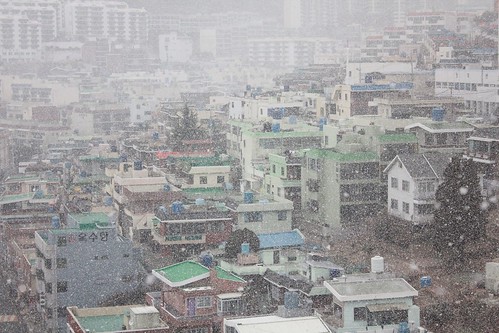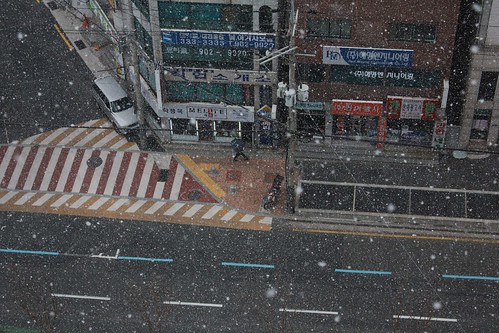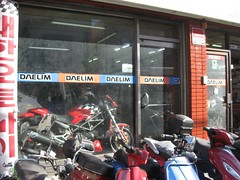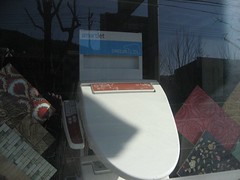Recently I met a man on the subway who fought for Korea in the Vietnam War. When I'm old, the only war story I'll have to tell my son is how I fought in the Credit Crisis. It's not nearly the same thing, but I didn't emerge from the financial battle we traders fought unscathed; my keyboard was damaged when a wall hit it after one of my data providers failed at a crucial point in the conflict. So for the last three years the keyboard has been propped up on my desk by the handle of a screwdriver. In this life you should live with the consequences of your mistakes... unless you actually caused the Credit Crisis, then apparently, not so much.
The Financial Crisis was a little like the Korean War; it ended in a stalemate rather than a victory. But now relative peace has returned to the financial world and our thoughts slowly turn to the process of rebuilding, I've decided to buy a new keyboard. I write a lot, so I'd like a nice keyboard, but that's always been a difficult task. These days keyboards are often made to the lowest common denominator because few people care enough to pay for high quality mechanisms beneath the keys, and I rue the day I let go of one of the early
Model M IBM keyboards that some university friends and I liberated a job lot of from a dumpster in the grounds of a large company we'd trespassed onto. IBM spared no expense in making keyboards back then – I think they charged $200 for them. That was a lot of money in those days – to put it into perspective if everyone who bought one of those early IBM keyboards had bought something cheaper and given the rest of the money to Ethiopia instead, there would have been no famine. Ten years later the Ethiopians were still suffering from hunger but these
excellent and still very usable keyboards were sitting outside in corporate rubbish bins all across the Western world. And we're very proud of our civilisation.
When I first came to Busan, I only had my English laptop and I needed a Korean keyboard to plug into it, but in those early days the quickest and lowest common denominator option was buying a $10 LG keyboard from a branch of Hi-Mart. I believed that the quality of the keyboard must be reasonable because it was made by LG and they wouldn't put their name to cheap rubbish. I was naïve about Korea back then.
Admittedly, $10 seemed quite cheap for a keyboard, but I really had no idea about Korean prices just after arriving here. As it happens, the keyboard had a dead feel to it which I quickly decided I didn't like, and a couple of keys which either didn't like to be depressed, or if they did, didn't like to come up properly afterwards. That was one of my first cultural lessons in Korea – the chaebols really
don't care what they stick their name on, and rather more oddly, neither – apparently - do Korean consumers. In fact if I was in any doubt, shortly afterwards I figured out that
Daelim make toilets, and motorcycles. Worse, in our neighbourhood we have a Daelim motorcycle dealership and the Daelim toilet dealership is only a few doors away, so it's hard to avoid. The potential for parody is enormous and you'd never, ever, get away with that in a Western country. I still don't quite follow how any self-respecting Korean youth can sit proudly on their Daelim while not thinking that back home their father is probably in the bathroom sitting on his.
Later I bought another keyboard from another Korean manufacturer which was a bit more expensive but strangely developed exactly the same fault. Then I bought a computer, which came with another keyboard. This had the now unique quality of actually working properly, but unfortunately it was also the one involved in the Credit Crisis friendly-fire incident.
Because I spend a lot of my life living in the dark these days – it's a Korean social metaphor as well as referring to the lighting in my office – I'd like a backlit keyboard. It won't help my life in Korea but it will help my typing. Even though there are quite a few backlit keyboards around, it's apparently little too specialist to find in the local branch of my
unnervingly-friendly electronics store, and there aren't nearly as many specialist computer stores here as you might expect because people use public PC rooms, their phones, and if they need a computer at home, the Internet to buy things from. There are two billion clothes shops in Busan – I know – I've counted them - but in all my time here I've only ever seen six computer stores, seven if you include a store that improbably just sells games for the
0.1% of people here who don't seem to pirate their software.
I can't really ask my wife to help me because she's so busy with our baby these days, and she's suffering from ICSF - Internet Comparison Shopping Fatigue - a serious health problem which big media is suppressing for their corporate masters. Fortunately I don't have one of those Korean wives that spends her life looking lovingly at her husband's wallet, but now I'm living in Korea with an insufficient level of Korean language ability, it does make it difficult for me to buy things too.
So my trick is to search through Amazon.com, find product codes, and enter them into Korea's shopping search engines along with the smattering of Korean I know such as '
키보드' and '
바보'. It usually gets results but the problem is too many results. Sites like
Gmarket and
Auction are just like eBay – so much so in fact that
eBay bought both of them - with multiple vendors selling the same item at sometimes suspiciously different prices. But whereas eBay is just one option in the online shopping space in England and the U.S., this seems to be how the vast majority of Internet shopping is done in Korea. Back in England, I'd know exactly which specialist online sellers to deal with – and when you found what you were looking for – it was only one entry on a page with one price and one set of claims, not twenty. And crucially, my attention wasn't being sapped by fifty different flashing boxes on the web page while I tried to read.
And there's another problem. After browsing through Amazon I found one of the Logitech keyboards I was looking for in Korea. But then I took a closer look at the product pictures – and while they were small, there was no mistaking the fact that they were pictures of the American product. That's the thing about keyboards with letters which are lit – it's easy to tell that there's only one letter on a key, and the Korean letter is at best, not lit up, or at worst, not there at all. I've encountered this before with another keyboard I was thinking of buying – there were no Korean letters, which surprised me before my wife told me that Koreans didn't necessarily mind that much because they knew where the Korean characters were as long as the English letters were visible, which is no use to me. Are these people selling the American product or the local Korean equivalent? I'm not sure, but what I do know is that despite this being a very shopping-driven culture, a lot of the actual selling technique strikes me as being half-assed. You'd think people would care about what they sell, but consumer protection law isn't very strong here, so perhaps issues such as accuracy and putting the right product picture up aren't so important.
I think there might be a business opportunity there. After all, if a tiny minority of Koreans choose to actually buy software rather than copy it from their friends, I can't help thinking that there might be a few Koreans who would prefer a more Westernised Internet shopping experience, where visiting an e-commerce page doesn't make you feel like you're tripping acid. Plus, with so many people here these days using their phones, iPads and other CPU and bandwidth-challenged non-Windows devices, maybe – just maybe – the era of Internet Explorer-only 10Mb Korean web pages needs to come to an end.
Meanwhile, my search for a keyboard goes on.



